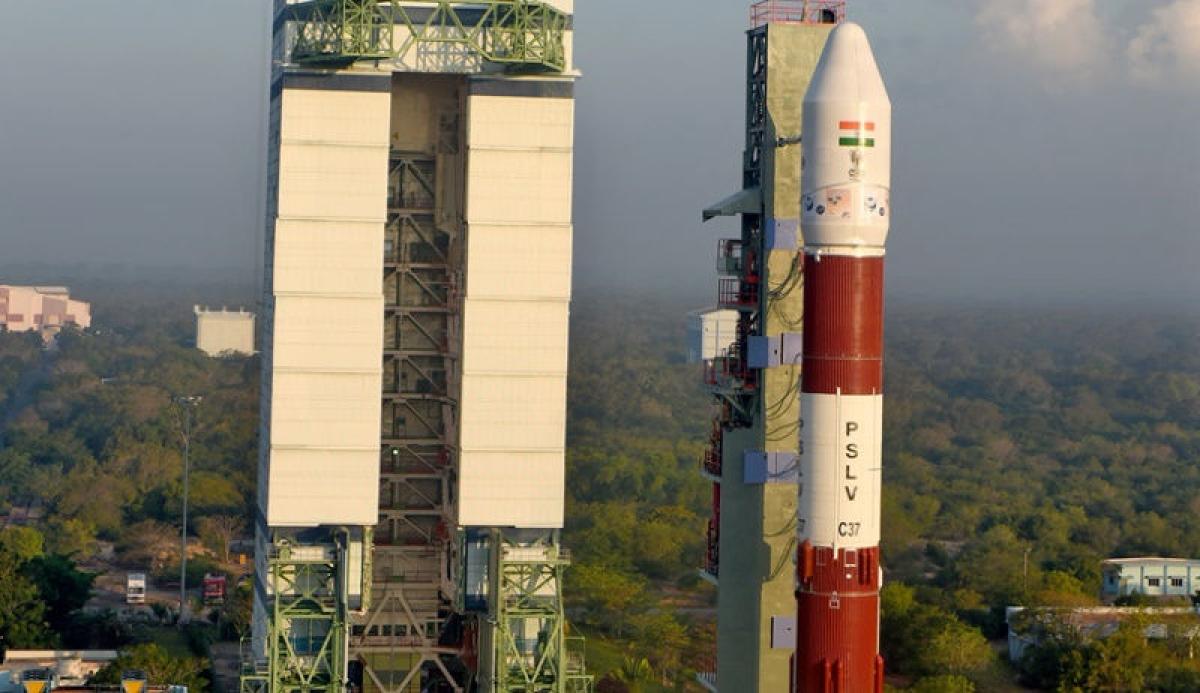Live
- MacBook Air M3 Hits Lowest Price in India: Find Details
- High Court Adjourns Hearing on Allu Arjun's Petition to 4 PM
- Pawan Kalyan praises Chandrababu Naidu at Swarnandhra Vision 2047 document launch
- Chirec International looks to transform education with Chirec 2.0 vision
- Telangana CM Revanth Reddy Responds to Allu Arjun's Arrest in Delhi
- Uddhav Thackeray to PM Modi: Pay attention to Bangladesh, act to end Hindus’ misery
- Allu Arjun Arrested: KTR Reacts on X, Calls Arrest Unfair
- Bold steps by Modi govt in reviving Indian heritage, culture: Union Minister
- What are the charges against Allu Arjun: Understanding the Charges Against Him
- Allu Arjun Objects to Arrest Procedure, Requests Breakfast and Change of Clothes
Just In

The 28-hour countdown for the launch of a record 104 satellites by India on board a single rocket from the spaceport of Sriharikota, about 125 km from Chennai, commenced on Tuesday.
The 28-hour countdown for the launch of a record 104 satellites by India on board a single rocket from the spaceport of Sriharikota, about 125 km from Chennai, commenced on Tuesday.
India will become the first country to script history if it succeeds in launching the 104 satellites in a single rocket.
The countdown for the launch of PSLV-C37/Cartosat2 Series satellite mission began at 5:28 AM soon after the Mission Readiness Review committee and Launch Authorisation Board gave its approval for lift off, Indian Space Research Organisation (ISRO) said.
Scientists have commenced filling of the propellant for the rocket, it said.
The space agency's trusted workhorse Polar Satellite Launch Vehicle PSLV-C37, on its 39th mission, would launch a record 104 satellites belonging to international customers.
What is significant about the launch is the number of satellites carried by a rocket. Compared to successful launch by the Russian Space Agency launching 37 satellites in one go, India will become the first country to script history if it succeeds in launching 104 satellites in a single rocket.
It will also be ISRO's second successful attempt after launching 23 satellites in one go in June 2015.
PSLV will first launch the 714 kg CARTOSAT-2 Series satellite for earth observation and then inject 103 co-passenger satellites, together weighing about 664 kg at lift-off into polar Sun Synchronous Orbit, about 520 km from Earth.
ISRO scientists have used the XL Variant - the most powerful rocket - earlier used in the ambitious Chandrayaan and during the Mars Orbiter Mission (MOM).
Of 101 co-passenger satellites, 96 belong to USA, five from International customers of ISRO - Israel, Kazakhstan, Netherlands, Switzerland, United Arab Emirates, respectively.
Two other Indian nano satellites, totally weighing about 1,378 kg, will also ride piggyback in the rocket
The nano-satellites belonging to international customers are being launched as part of the arrangement by Antrix Corporation Ltd (ANTRIX) the commercial arm of the ISRO. Cartosat-2 Series, which is the primary satellite, will be similar to the earlier four satellites in Cartosat-2 Series.
After coming into operation, it will provide remote sensing services.Images sent by it will be useful for coastal land use and regulation, road network monitoring, distribution of water and creation of land use maps, among others.
Cartosat-2 Series has a mission life of five years. The two Indian Nano-satellites INS-1A and INS-1B were developed as co-passenger satellites to accompany bigger satellites on PSLV.
The primary objective of INS (ISRO Nano Satellite) is to provide an opportunity for ISRO technology demonstration payloads, provide a standard bus for launch on demand services.
INS-1A carries Surface Bidirectional Reflectance Distribution Function Radiometer and INS-1B caries Earth Exosphere Lyman Alpha Analyser as payloads.

© 2024 Hyderabad Media House Limited/The Hans India. All rights reserved. Powered by hocalwire.com







